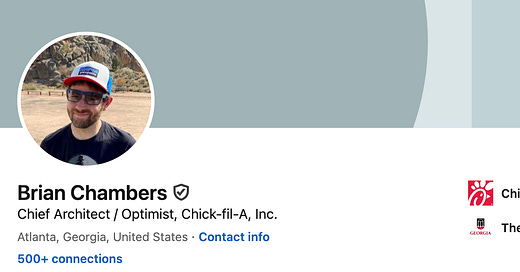The Chamber 🏰 of Tech Secrets is open. If you are wondering where the edge compute lab posts are, hang in there. I am still waiting on some new hardware and doing some research on design. Check out Edge Monsters if you’re hungry for that in the meantime. Today, I want to talk about job titles.
Chief Optimist
I have a new title on LinkedIn. I hope it shows up in everyone’s feed to congratulate me on. 😜

I didn’t get a new job at a new company or a new role at my current company. Nobody told me to do anything differently than before, actually.
Internally, my title is the same as it has been for two years: “Sr. Director, Enterprise Architecture”. We don’t use words like “Chief”… we don’t have a CISO title even though we have a CISO role. But, I am the senior-most Enterprise Architect, which is typically called a Chief Architect… so I use that to make my job easier to understand for folks outside the company. No ego.
Now you know why “Chief Architect” was there… but about the Optimist Part?
Do titles matter? I don’t think they matter much…
Where they matter:
Communicating what you are likely responsible for to the outside world
Finding the right people to network with
I don’t know… that’s all I can think of except for…
How you think of yourself (in terms of the responsibilities you have and the attitude you bring)
The last one is the most important one, and this is is why I changed my title to Chief Architect / Optimist.
Since my role is “enterprise” (aka the entire organization) in nature, I see a lot of stuff. Most stuff. It is easy to get very hung up on the things that aren’t going particularly well or on decisions that trend in a negative direction or thing that are utterly irrational. If there are poor architectures, I usually see them. If there is organizational politics, I see it. If there is bureaucracy, I see it. If there is a lack of agility, I see it. If there is a failing project, I see it. You get the idea.
All of these things have the ability to create a downward spiral of pessimism, which is quite frankly a terrible place to find oneself on a daily basis and a poor position to stay in for any length of time, especially as a leader. Especially as a leader that wants to inspire positive change.
For this reason, I have decided to think of myself as the Chief Optimist for my company. Optimistic about what?
I am optimistic about the way that technology can impact our business and help us fulfill our mission, which is the best mission of any company I know. I am optimistic that we can build things that are great, run projects that succeed, use the best available tools and systems, manage our data, harness the potential of AI, and more.
Why did you put this on LinkedIn Brian? Well, sometimes you need accountability to help you get where you want to go. By making myself “Chief Optimist”, people are likely to ask me about it. Feel free to. Most importantly, by putting it out there as an idea, I force myself to think about it and internalize it… and here I am writing about it… so now I can act on it.
Yes, I know unbridled optimism is not that useful.
Yes, I know this sounds naive.
Yes, I know this doesn’t mean everything will now magically go according to patterns or plans and will still be messy.
Yes, I know this looks SUPER cheesy.
Yes, I know I can’t just pretend that everything is awesome all the time.
Yes, I know I have to acknowledge failures and I know I still have to meet people where they are.
Yes, I know this is not a real title (but how many LI titles actually are real anyway?)
But now I can face a challenging or frustrating situation with the mindset of “we are going to do this and do it well” and ask others to help me make that a reality. Instead of bringing “whats wrong” to the table, I’ll focus on the shared “right” that we are aiming towards. Instead of talking about whats frustrating around me, I can bring optimism to the table and we can figure out, together, how we can go forward.
I’ll be more helpful and less defensive. And those are better qualities in a leader. I want to get great stuff done. I love what technology can do for any and every business. Watch SpaceX catch a rocket or the pace of change in AI… there is every reason for techno-optimism. It is that attitude that I wish to embody.
The Chief Optimist, at your service. 🫡


Love this.
Titles are indeed made up.
There's a few variations to this phrase, but this version: "you can see a person's true character by the way they treat others who are thought to be of less importance or beneath them." is one that can be interpreted to mean:
- roles are made up
- we're the role of "fellow-human" first before we're a corporate role... or we're each the role of someones son, daughter, mom, dad, brother, sister, friend etc etc., first.
- we treat the "human", not the "role".
Titles help by articulating responsibility, focus, expectations, skill... sure....but actual "impact" and "character", which are far more important, are nowhere close to being summarized in a title. Until now!